|
.
.
|
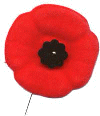
lest
we forget
|
GlescaPals
tribute to 'oor forces'
|
 The Royal & Merchant Navy The Royal & Merchant Navy

|
...
|
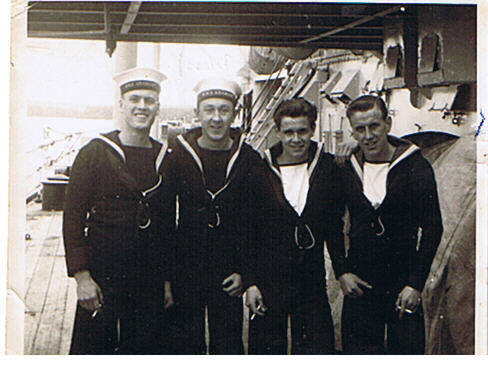
|
GlescaPal jeanC, Teeside ......
my hubby Jim Franklin on the left wi' some mates on HMS Adamant in May 1955 during a Nato exercise called Fish Play.
A month after we got married. !
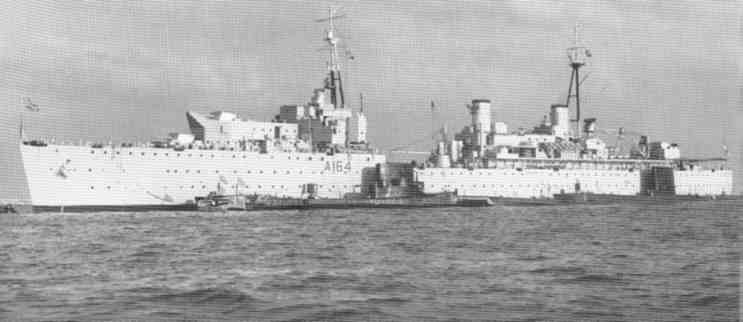
HMS Adamant |
.
..
.
|
GlescaPal, Jim Jeffrey (Lobeydosser), Canada,
Nov2006, extract from MB ...." Here’s
a photo of my dad , Frank Jeffrey, as a 16-year-old sailor from
Sydney Street in the Calton. He was 16 years 4 months when he joined The
Royal Navy as a Boy Seaman on 29 July 1915.
During his service he had many “interesting” experiences, but like so
many WW1 survivors, rarely spoke of them.
He served at the Battle of Jutland, escorted Atlantic convoys and served
on ” Q Ships”/””Mystery Ships” When we kids would ask him, “Whit did ye
dae in the War, Da?” he would reply, “I got torpedoed.” End of
conversation.
Well, I have been looking into our family history and have found some
information about the torpedoing of HMS DRAKE ,oor Da’s ship.......
HMS Drake 1902 -1917
Frank Jeffrey |
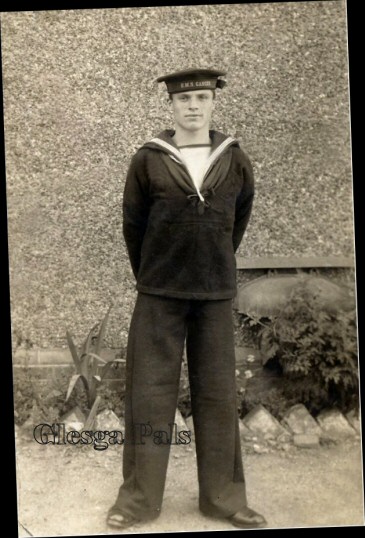
|
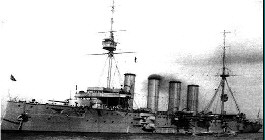 On the morning of October 2nd 1917,
HMS
DRAKE was several miles off the north-west tip of Rathlin Island off the
north coast of Ireland carrying out routine escort duties with convoy
HH24 inbound from America when a German Submarine U79 hit HMS Drake with a torpedo killing 19
seamen though she remained afloat. On the morning of October 2nd 1917,
HMS
DRAKE was several miles off the north-west tip of Rathlin Island off the
north coast of Ireland carrying out routine escort duties with convoy
HH24 inbound from America when a German Submarine U79 hit HMS Drake with a torpedo killing 19
seamen though she remained afloat.
The crippled ship made it into Church
Bay where she was abandoned to capsize in 18 metres of water a few
hundred metres from shore. There were no casualties as a result of the
capsizing , so almost 900 sailors lived to fight another day.
Frank left the Navy in 1921 after serving 6 years and returned to live in
the Calton, Glasgow |
GlesgaPal, Jim Jeffrey (Lobeydosser), Canada,
Nov2006
......like his Dad, Frank Jeffrey, oor Jim
also served in the Royal Navy.
On 5th November, 1946, he left his home in Glasgow's Garngad
to report to
HMS ROYAL ARTHUR, Corsham, Wiltshire to do his
National Service.
During the two weeks there he was kitted out and converted from a
peace-loving civvy to a serviceman just thirsting for action. Next,
the whole group of 18-year olds were transported to HMS RALEIGH,
near Plymouth, to do three months basic seaman training
In the photo of the four trainee Ordinary Seamen at RALEIGH,
Jim Jeffrey
is the one bottom left, kneeling.
When they all had successfully completed the
training period,
The Admiralty designated them as "Trained Men" and their
pay went up from four bob a day to five bob a day.
( Well, a shillin' was o lot of money in thae days says Jim !!)
|
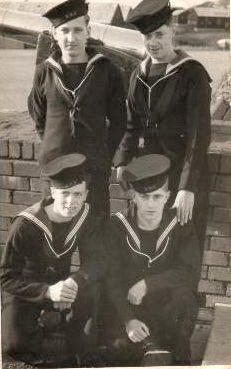 |
|
In April, 1947, he was posted to HMS CHEQUERS
out in the Med.
The photo below shows the ship entering the harbour in Malta.
HMS CHEQUERS was built by Scott's of Greenock in 1944. Since she
was Clyde-built Jim knew she would be a splendidly seaworthy vessel
which was very important to him as he had never been able to swim
a stroke---not even dog paddle! Jim was proud of the fact that
CHEQUERS was Leader of the 1st Destroyer Flotilla in the
Mediterranean.
Jim was a Bosun's Mate and assisted his Quartermaster in keeping
watch at the gangway and also in the wheelhouse at sea. He enjoyed
being at sea but didn't like barrack life at all.
All
good things must come to an end, and Jim was demobbed in the spring
of 1948. Although he enjoyed doing his National Service, he was glad
to get back home and get on with the rest of his life.
Incidentally, a couple of years after Jim left the ship, Prince
Phillip was appointed First Lieutenant of HMS Chequers
|
|
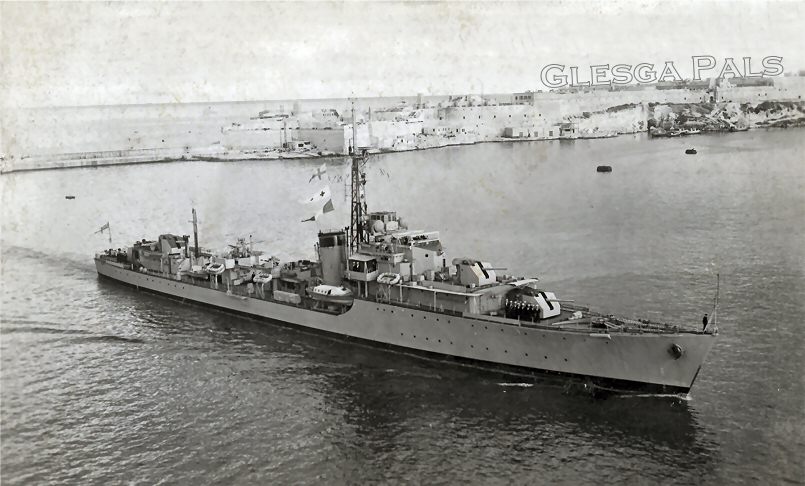 |
Frequently, the ship was engaged in patrols off the coast of
Palestine to intercept and prevent the so-called
"Illegal Jewish Immigrant Ships" from landing in Palestine. It was
a task that none of the ships crew liked doing.
The photo below shows HMS CHEQUERS taking part in the action that
took over the most famous of these ships,
the Israeli ship EXODUS 1947, and brought her into Haifa,
Israel's northern seaport. |
|
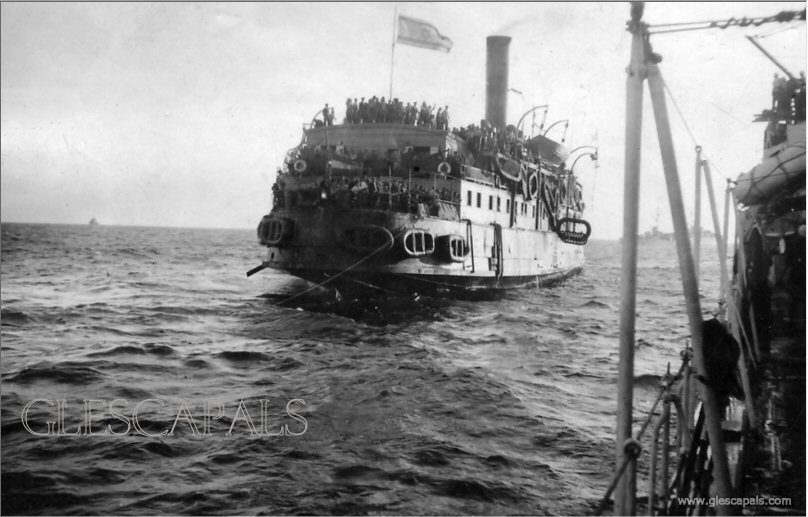 |
After World
War II, as tensions mounted in Palestine between the
Jewish settlers and Arabs, the British Government
attempted to appease the Arab citizens by limiting
the immigration of Jews to Palestine. British
authorities would detain ships and send them back to
their ports of origin within Europe in an attempt to
stop the illegal immigration. Since remaining in
Europe meant certain death for many of these
immigrants, illegal immigration to Palestine
increased.
Exodus 1947 was a ship
carrying Jewish emigrants, that left France on July
11, 1947 with the intent of taking its passengers to
Palestine, then controlled by the British. Most of
the 4,515 emigrants, including 655 children, were
Holocaust survivor refugees, who had no legal
immigration certificates to Palestine. Following
wide media coverage, the British Royal Navy seized
the ship, and towed it to Haifa in July 18th, where
the immigrants were all deported back to France. At
the French port they refused to disembark and after
24 days the British decided to return the would be
immigrants to British occupied Germany.
World public opinion was one of outrage and the
British policy was changed illegal immigrants were
not sent back to Europe but instead transported to
detention camps in Cyprus.
footnote: The majority of passengers
on the Exodus 1947 eventually settled in
Israel.
|
.
| Royal & Merchant Navy |
Page8 |
Page8b |
|

|
Secure
your families place in Scotland's heritage and leave your legacy
Adding an old family photo and story
to glesga.ukpals website is simply a bargain
Get your very own family photo and story
on this website for a small donation. |
..
|



 The Royal & Merchant Navy
The Royal & Merchant Navy




 On the morning of October 2nd 1917,
HMS
DRAKE was several miles off the north-west tip of Rathlin Island off the
north coast of Ireland carrying out routine escort duties with convoy
HH24 inbound from America when a German Submarine U79 hit HMS Drake with a torpedo killing 19
seamen though she remained afloat.
On the morning of October 2nd 1917,
HMS
DRAKE was several miles off the north-west tip of Rathlin Island off the
north coast of Ireland carrying out routine escort duties with convoy
HH24 inbound from America when a German Submarine U79 hit HMS Drake with a torpedo killing 19
seamen though she remained afloat. 


